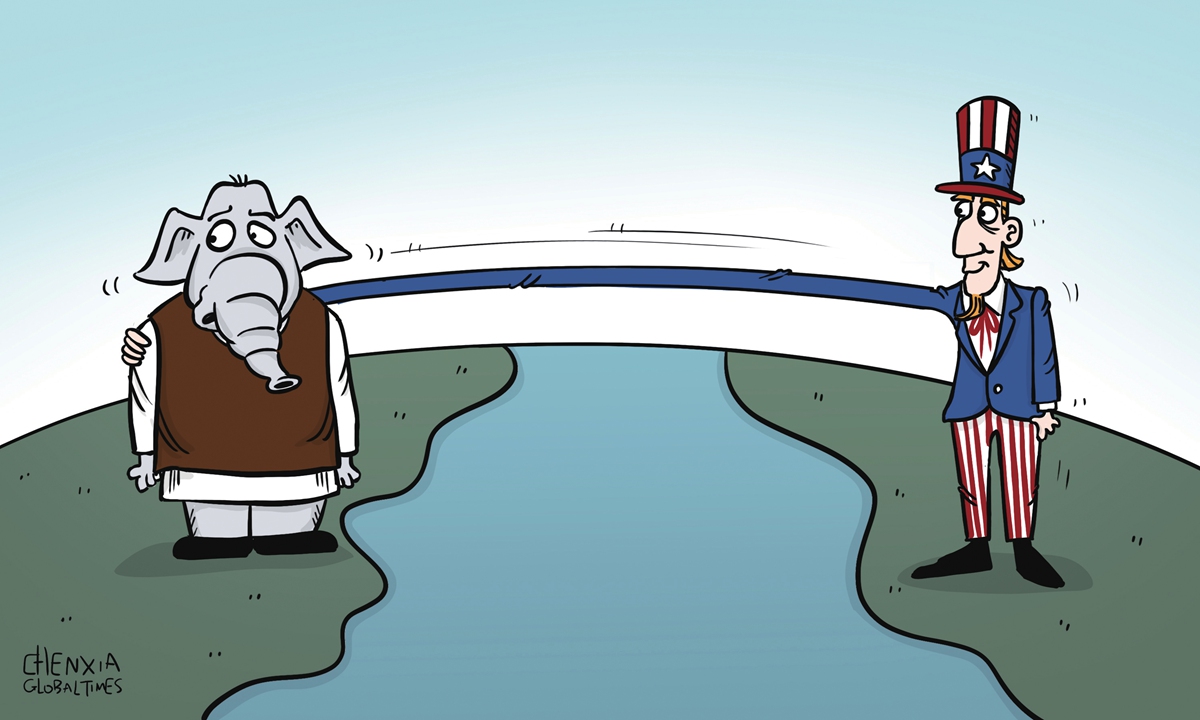
US, India Illustration: Chen Xia/GT
Russian Foreign Minister Sergey Lavrov said in an interview with Russian state TV recently that Washington is seeking to deploy military bases in neighboring countries of Afghanistan. He suggested that the US has been trying to persuade India to provide opportunities on its territory for the US military. But India's stance remains unclear.The US anti-terrorism mission in Afghanistan won't come to a halt thoroughly even after its withdrawal from the country. What Washington desires are politically reliable military bases with convenient access and a stable situation for its Unmanned Aircraft Systems. But now, with the rejection of Central Asian countries and instability in Pakistan, the US requires opening up new platforms to make its military presence in South Asia more diverse and flexible.
If the US can further enhance its cooperation with India, which has a military base in Tajikistan - the Farkhor Airbase, Washington will have the opportunity to use this airbase. This will make it more convenient for the US to enter and exit Afghanistan. Thus, Washington now pays more attention to military cooperation with New Delhi.
India will possibly allow the US to use some Indian military facilities. But India will accept neither military bases to be established by other countries on its own territory nor "a state within a state" owned by the US.
On the one hand, India did allow the US to use Indian military facilities during actions against a third country. In the 1950s and 1960s, the CIA vigorously supported anti-China armed groups. Without acquiescence and facility support from India, the CIA would have had great difficulties carrying out large-scale transportation of personnel and supplies in deep inland areas like the Himalayas.
On the other hand, agreements between the two countries have already provided legal guarantees for the US to use Indian military bases. Washington and New Delhi have signed the Logistic Exchange Memorandum of Agreement (LEMOA), the Communications Compatibility and Security Agreement (COMCASA), and the Basic Exchange and Cooperation Agreement on Geospatial Cooperation (BECA). The LEMOA signed in 2016 stipulates that both parts could use military bases of each other's for logistics operations. In 2021, the two countries have discussed the issue of jointly forming an Integrated Underwater Surveillance System (IUSS), showing that the military facilities of the two countries are progressing toward more cooperation.
During his visit to the US, Indian Prime Minister Narendra Modi issued a joint statement on September 24, 2021, reaffirming that the two countries will keep "close defense engagements in information sharing, sharing of logistics and military-to-military interactions, strengthening cooperation in advanced military technologies, and expanding engagements in a multilateral framework including with regional partners."
However, India's doubts about the alliance system have not undergone fundamental changes. Even those pro-US forces in India are worried about whether the alliance with the US will weaken the independence and strategic autonomy of India's foreign policy, whether it will damage its pursuit of greater status, and whether it will make India face more uncertainties by further infuriating China.
Therefore, it is impossible for the US and India to end up with an alliance system like the US-Japan alliance where the ally is actually controlled by the US, an option unacceptable to India. The two countries, though, may reach a kind of "backstage alliance relationship" - a quasi-alliance or de facto alliance, which would neither require political treaties to guarantee nor rise to the level of national strategy. With authorization from political leaders, this "backstage alliance" can be implemented by military departments with strong operability, invisibility, and flexibility to be started or stopped at any time as needed.
It is worth noting that China's attitude is also an important factor affecting the US-India military relations. If China's pressure on India is not strong enough, India is likely to move closer to the US regardless China's opposition; if the pressure is too much, India has no better choice but to move closer to the US
Judging from the current situation, if India insists on the mistaken belief that China has established or will soon establish a military base in Pakistan, then the possibility of India opening military bases to the US will greatly increase.
(The author is a professor at the Center for American Studies, Fudan University.)






